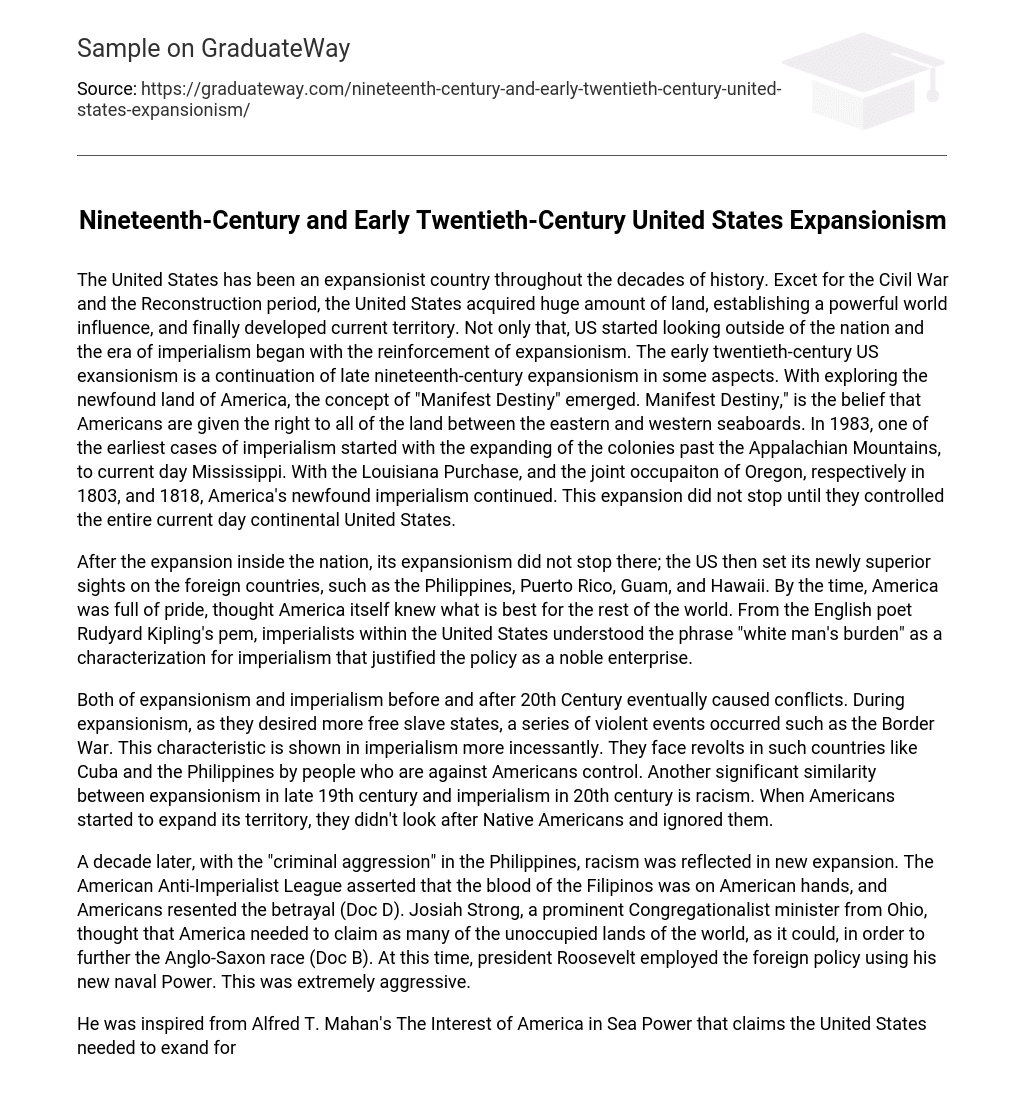Throughout its history, the United States has pursued expansion. With the exception of the Civil War and Reconstruction era, the US has acquired substantial amounts of land, establishing considerable global influence and developing its current territory. Additionally, the US began to look beyond its borders, giving rise to imperialism and reinforcing expansionism. The early 20th century expansionism in the US can be seen as an extension of late 19th century expansionism. As America explored newly discovered lands, the idea of “Manifest Destiny” emerged, asserting Americans’ right to all land between the eastern and western coasts. Through events like the Louisiana Purchase in 1803 and joint occupation of Oregon in 1818, American imperialism expanded by colonizing areas beyond the Appalachian Mountains and reaching as far as present-day Mississippi. This expansion continued until complete control over continental United States was achieved.
Following its expansion domestically, the United States did not cease its desire for further territorial acquisitions. Instead, it shifted focus towards foreign regions such as the Philippines, Puerto Rico, Guam, and Hawaii. Driven by a sense of national pride, America held the belief that it possessed superior wisdom to determine what was optimal for other nations. American imperialists perceived Rudyard Kipling’s “white man’s burden” poem as affirmation of their honorable pursuit of imperialism.
Both expansionism and imperialism, both before and after the 20th Century, ultimately led to conflicts. In the era of expansionism, there were violent events like the Border War, driven by the desire for more free slave states. This characteristic is even more prevalent in imperialism, where revolts against American control occurred in countries like Cuba and the Philippines. Racism is another noteworthy parallel between late 19th-century expansionism and 20th-century imperialism. Native Americans were disregarded and ignored as Americans expanded their territory.
A decade later in the Philippines, an act of “criminal aggression” occurred which demonstrated racism and expansionism. The American Anti-Imperialist League accused America of being responsible for the deaths of Filipinos, leading to resentment among the American people. Josiah Strong, a prominent minister, advocated for America to acquire as much unoccupied land as possible to strengthen the Anglo-Saxon race. President Roosevelt embraced an aggressive foreign policy during this time period, utilizing his newly acquired naval power.
He was influenced by Alfred T. Mahan’s The Interest of America in Sea Power, which put forth the argument that the United States required expansion for both military and economic reasons (Doc C). Nonetheless, there are numerous characteristics that distinguish these two periods. The shift from expansionism to imperialism is more evident than its continuation. Initially, expansionism encountered fewer obstacles since it pertained to domestic growth. Conversely, imperialism was more intricate as it aimed to conquer foreign lands, often leading to uprisings.
Before the United States focused on international matters, countries like Germany, Britain, Japan, and Russia had already exerted their dominance worldwide (Doc A). America took inspiration from these nations and felt the need to assert its own power. Furthermore, the methods employed by America in acquiring new territory varied significantly. During its expansion phase, America obtained land through treaties and land purchases. Conversely, when engaging in imperialism, America invaded and forcefully subjected foreign nations. This is evident in the annexation of Hawaii in 1898, which ultimately resulted in dissatisfaction and resistance among the Hawaiian people towards the United States.
Throughout its history, America has consistently displayed imperialistic tendencies. From its establishment as a nation to its current position as a global enforcer, the country has pursued expansion and territorial acquisition. In the early twentieth century, the United States shifted from a national focus to an international one but still maintained its goal of growth and territory accumulation.





